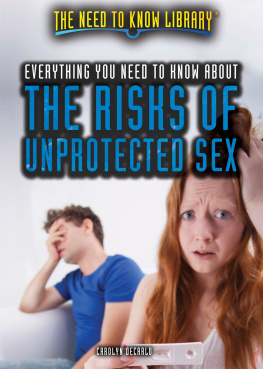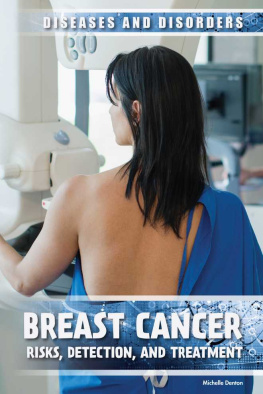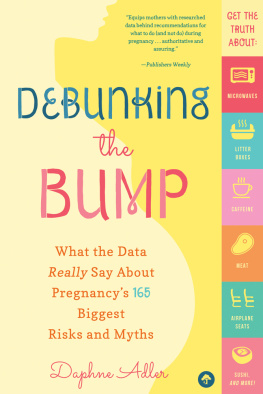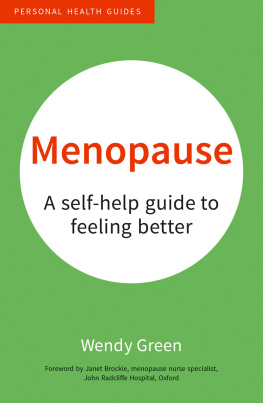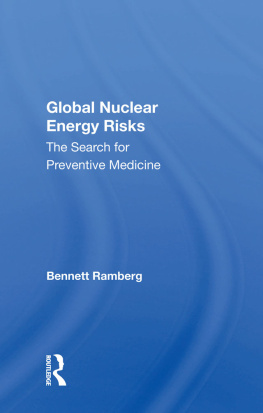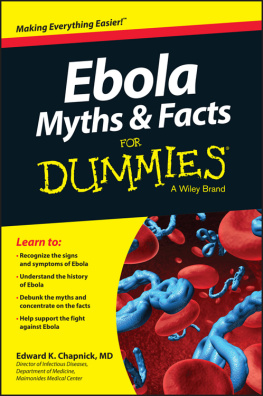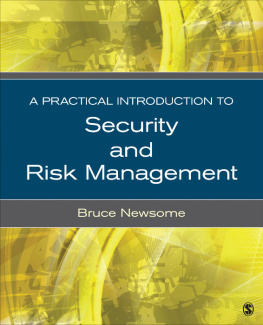Published in 2019 by The Rosen Publishing Group, Inc.
29 East 21st Street, New York, NY 10010
Copyright 2019 by The Rosen Publishing Group, Inc.
First Edition
All rights reserved. No part of this book may be reproduced in any form without permission in writing from the publisher, except by a reviewer.
Library of Congress Cataloging-in-Publication Data
Names: DeCarlo, Carolyn, author.
Title: Everything you need to know about the risks of unprotected sex / Carolyn DeCarlo.
Description: New York : Rosen Publishing, 2019 | Series: The need to know library | Audience: Grades 7-12. | Includes bibliographical references and index.
Identifiers: LCCN 2018011696| ISBN 9781508183617 (library bound) | ISBN 9781508183600 (pbk.)
Subjects: LCSH: Unsafe sexJuvenile literature. | Sex instruction for childrenJuvenile literature.
Classification: LCC HQ76 .D425 2019 | DDC 306.77dc23 LC record available at https://lccn.loc.gov/2018011696
Manufactured in the United States of America
CHAPTER ONE
WHAT IS UNPROTECTED SEX?
CHAPTER TWO
SYMPTOMS AND SIGNS
CHAPTER THREE
HOW DO I STAY SAFE?
CHAPTER FOUR
I HAD UNPROTECTED SEX. NOW WHAT?
Y ou wake up in an unfamiliar place. Or maybe your surroundings are familiar, but your body feels different. Perhaps youre in your own bed at home and your body feels fine, but your head is sore. You know something happened the night before but you cant remember what it was. Then you start to remember. You and your partner got carried away. It may have been a mutual decision or you may have felt forced.
You may not quite remember how it happened. Maybe you were confidently going along with it, caught up in the moment, or under the influence of drugs or alcohol. However it happened, youre starting to feel a bit panicky. Your heart feels like it skips a beat or two as it sinks in: you had unprotected sex. Now what?
You are probably feeling an array of emotions, no matter how it happened. Your partner may still be lying next to you, but you might not feel comfortable asking him or her for help. Or he or she may be gone, and you are reflecting on this alone. Or maybe you talk about this together and agree that you both need to do something about this mistake. But what are the possible consequences? And what can you do?
If you have had unprotected sex, you may be at risk for a sexually transmitted infection (STI, sometimes known as a sexually transmitted disease, or STD), human immunodeficiency virus (HIV), anddepending on the situationpregnancy. It is important for you to get tested for STIs before having any more sexual relations. It is a good idea to get tested immediately after having unprotected sex. However, some diseases, such as HIV, take a while to show up in a blood test, so you should also go back for another round of tests at a later date.

If you just had unprotected sex, you may be dealing with a lot of questions related to yourself and your partner. Do not panic! There are steps you can take.
If pregnancy is a concern for you or your partner, you may want to consider obtaining emergency contraception such as Plan B (levonorgestrel), otherwise known as the morning-after pill. This is birth control that can prevent pregnancy after unprotected sex, and it is more effective the sooner you take it. You can get Plan B over the counter without a prescription, regardless of your age or gender, and you may be able to get it for free from Planned Parenthood or a health care provider. Although pharmacists are legally allowed to refuse to give you Plan B, they are supposed to refer you to another pharmacy that can provide it.
Realizing youve had unprotected sex is certainly very scary. No matter what path you take, it is important for you to know that you are not alone. Learning more about your options can help you face the next steps.
U nprotected sex means having sex (whether it be vaginal, anal, or oral) without using a condom. When two people decide to have sex, they should be prepared, protect themselves, and consider any possible consequences. Choosing to have unprotected sex of any kind puts your body at risk of contracting HIV and other STIs. Protecting yourself against STIs, HIV, and unplanned pregnancy is incredibly important, empowering, and not too hard as long as you have all the right information.
HOW DO STIS SPREAD?
Most STIs are spread through intimate bodily contact or exchange of fluids. There is a risk of STI in any sexual encounter in which a body that is carrying an STI comes into direct physical contact with another body.
Sex can be defined in a variety of different ways. Some people think of sex simply as a penis going into a vagina, but this is not the only way humans have sex. Aside from vaginal sex (penis-in-vagina intercourse), some different forms of sex include oral sex (mouth-to-genital contact), anal sex (penis-in-anus intercourse), fingering or hand jobs (hand-to-genital contact), or dry humping or genital rubbing (contact between the genitals without penetration).
WHATS THE BIG DEAL ABOUT STIS?
According to a 2017 report by the Centers for Disease Control and Prevention (CDC), 110 million people in the United States have an STI. Perhaps even more alarmingly, 85 percent of Americans living with genital herpes dont even know they have the virus. The CDC also estimates that 19 million people contract STIs each year, and almost half of those people are between fifteen and twenty-four years old. At least 50 percent of sexually active adults will have a human papilloma virus (HPV) infection at some point in their lives, but in 90 percent of those cases, the bodys immune system will fight off the disease within two years.

Hepatitis B cannot be cured, but it can be prevented with a vaccine. The vaccine is recommended by the CDC for all infants and children up to eighteen years old.
When it comes to HIV, more than 1.2 million Americans are living with the disease, and one in eight of those arent aware that theyre infected. More than 12 million Americans (or, one in twenty people) have been infected by hepatitis B. There are nearly 100,000 new cases each year, while approximately 5,000 Americans die from the virus and its complications each year. As for bacterial infections like chlamydia and gonorrheawhich are both treatable with a round of antibioticsless than half of new infections are not reported because there are no symptoms so the carriers dont even know they have them.
Not all these types of sex can lead to pregnancy or the spread of HIV, but all of them do carry some risk for picking up an STI. Some STIs can even be spread via sex toys, so it is important to properly clean and disinfect any sex toys that have been used by another person. Another option is to put a condom on a sex toy or, ideally, not share sex toys at all.

